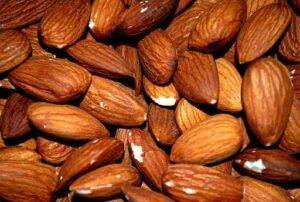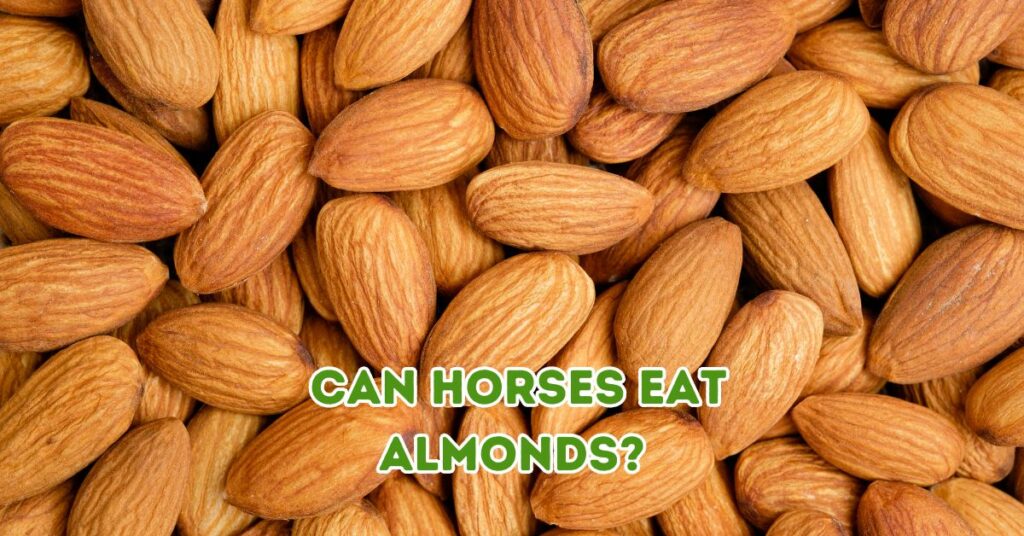As an Amazon Associate we earn from qualifying purchases.
Can horses eat almonds? This is a common question that many horse owners have, and the answer may surprise you! Almonds are a popular snack for humans, but can they be given to horses as a treat? In this article, we will explore the answer to this question and look at some of the potential risks or benefits associated with feeding horses almonds.
Can Horses Eat Almonds? Yes or No
Can horses eat almonds? The short answer is yes, but it is important to note that they should not be given to horses in large quantities due to the high-fat content. Almonds are a healthy treat for horses and can provide them with some of the essential fatty acids that their diet may be lacking. However, it is important to give them in moderation and make sure they are unsalted, as salt can be toxic to horses.
Note: Did you know that almonds are actually fruits, not nuts? They are known as drupes and are part of the same family as plums, meaning they grow in trees. Once they are ready to be harvested, the dry hull is removed.
Do Horses Like Almonds?
Yes, horses love almonds! They are a great and nutritious snack for them. They can be fed as a treat, or even used as a reward for training. Just be sure to feed them in moderation, as too many can lead to digestive issues.
How To Feed Almonds To Your Horse
When feeding your horse almonds, look for the unsalted and unsweetened kind. Make sure that they are shelled and broken into small pieces, as whole nuts can cause choking in horses. As with any treat, almonds should only be given in moderation.
To feed your horse almonds, you can either hand-feed them or sprinkle them on their feed. If you choose to hand-feed, try to do it in a positive way, using positive reinforcement with treats. Make sure that you don’t give too many almonds at once, as it can cause digestive upset.
When sprinkling almonds on your horse’s feed, be sure to mix them in with their regular feed so that the almonds are spread out. This will help to prevent your horse from getting too much of any one nutrient.
SEE ALSO : Can Horses Eat Kale?
Almonds can be an excellent snack for your horse, but like with any treat, moderation is key. Enjoy feeding your horse almonds and watch as they happily munch away!
Health Benefits Of Eating Almonds For Horses
Almonds are a great source of nutrition for horses, as they are packed with essential vitamins and minerals. Horses are grazing animals, so they need plenty of fiber in their diets to stay healthy. Almonds are a great way to provide your horse with the fiber and nutrition they need.
Vitamin E
Almonds are an excellent source of vitamin E, which helps to protect horses from oxidative stress. Vitamin E helps to support healthy skin, coat, and muscles, and helps to maintain a healthy immune system. Almonds also contain magnesium, which helps to support healthy nerve and muscle function. Magnesium is also necessary for proper electrolyte balance, which is essential for healthy cardiovascular function.
Healthy Fats
Almonds are also a great source of healthy fats, which are important for proper coat and hoof health. The healthy fat content helps to keep your horse’s coat shiny and their hooves strong. Additionally, almonds provide essential fatty acids, which are important for overall health and well-being.
High Protein
Almonds are also high in protein, providing your horse with an important source of energy. Protein helps to build and maintain muscle mass, and is especially important for growing horses. Almonds are a great way to help your horse meet their protein needs.
High Fiber
Almonds are also high in fiber, providing your horse with the necessary amount of roughage to aid digestion. Fiber is important for keeping your horse’s digestive tract functioning properly, and helps to prevent colic and other digestive issues.
Antioxidants
Finally, almonds are a great source of antioxidants, which are important for overall health and wellness. Antioxidants help to protect your horse from free radical damage, and can help to reduce inflammation.
Overall, almonds can provide your horse with a great source of nutrition and health benefits. Almonds are an excellent source of vitamins, minerals, healthy fats, protein, and fiber, making them a great addition to your horse’s diet. Adding almonds to your horse’s diet can help to ensure that your horse is getting the essential nutrients they need to stay healthy and happy.
Safety Considerations Of Feeding Almonds To Your Horse
When it comes to feeding almonds to your horse, there are several safety considerations to keep in mind. Almonds are high in fat and protein, so they should be fed in moderation. If your horse has a history of laminitis or obesity, it is best to avoid feeding almonds altogether. It is also important to make sure that the almonds you feed your horse are unsalted, as too much salt can be dangerous for horses. Lastly, be sure to only feed your horse almonds that are fresh and not moldy, as moldy almonds can cause colic and other serious health problems. With these safety considerations in mind, you can provide your horse with a tasty, healthy treat.
How Many Almonds Should I Feed My Horse?
Almonds are high in fat and as such, you should feed your horse no more than 10 or 12 almonds as a treat per day.

Can Horses Eat Almonds Shells?
The answer to the question of whether horses can eat almond shells is a resounding yes! Almond shells are not only safe for horses to eat, but they can also provide a great source of dietary fiber. Fiber is an important part of a horse’s diet, as it aids in digestion and keeps them feeling full for longer. Almond hulls are also high in minerals such as calcium, magnesium, potassium, and iron, as well as vitamins and antioxidants. Horses can also benefit from the anti-inflammatory and anti-bacterial properties of almond hulls. So, if you’re looking for a nutritious snack for your horse, try feeding them some almond shells!
ALSO SEE: Can Horses eat Carrots?
Can Horses Eat Almonds Leaves?
Horses should not eat almond leaves as they can be toxic to them. Almond leaves contain cyanogenic glycosides which are a type of compound that can cause cyanide poisoning in horses. This poisoning can cause a variety of symptoms including colic, labored breathing, and even death. If eaten in small amounts, almond leaves can also cause digestive problems such as colic, diarrhea, and weight loss. Therefore, it is best to avoid feeding almond leaves to horses to prevent any health issues.
Additionally, avoid feeding leaves of plants/fruits like cherries, plums, and peaches. They bear grave consequences when consumed.
Can Horses Eat Almonds Butter?
No, horses should not eat almond butter. Almond butter is high in fat and can cause digestive issues or even colic in horses. It’s also high in calcium, which can contribute to the development of laminitis. Additionally, horses have difficulty digesting the high fat content in almond butter and therefore, it often passes through the digestive tract without being broken down.
Can Horses Eat Almonds Flour?
Almond flour is safe for horses to eat. To prepare, simply get 1/4 cup almond flour or meal once or twice a day. If you are going to use whole almonds and grind them, 1/2 cup whole almonds will yield 1/4 cup ground almonds and make it as part of their diet.
My horses prefer natural almond flour because the skins haven’t been taken away and they contain bioflavonoids.
Can Horses Eat Almonds – Final Thoughts
In conclusion, the answer to the question, “Can horses eat almonds?” is yes, but with moderation. Almonds can provide horses with some beneficial nutrients, but they should always be fed in moderation and should never be the sole source of nutrition for horses. It is important to speak with a veterinarian about the best diet for your horse to make sure they are getting all the nutrients they need. And don’t hesitate to take a handful of almonds yourself: the nutrition in almonds is very beneficial to riders!
Amazon and the Amazon logo are trademarks of Amazon.com, Inc, or its affiliates.

Hey there, I’m Jasmine! I’m a total horse fanatic and have been working with these amazing animals for as long as I can remember. I’m passionate about sharing my love for horses with others and helping them learn more about these majestic creatures. As a professional horse trainer and riding instructor, I’ve developed a deep understanding of equine science and am committed to the welfare of horses. That’s why I founded OwnTheHorse.com, a blog where I share my knowledge and insights with fellow horse enthusiasts. I love connecting with my readers and building a friendly community of horse lovers. Whether you’re a seasoned equestrian or just starting out, I’m here to help and inspire you. Above all, I’m a friendly and compassionate person who truly cares about the well-being of horses and their human companions.

